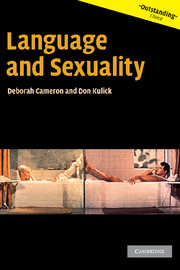Book contents
- Frontmatter
- Contents
- Preface
- 1 Making connections
- 2 Talking sex and thinking sex : the linguistic and discursive construction of sexuality
- 3 What has gender got to do with sex? Language, heterosexuality and heteronormativity
- 4 Sexuality as identity: gay and lesbian language
- 5 Looking beyond identity: language and desire
- 6 Language and sexuality: theory, research and politics
- Notes
- Bibliography
- Index
6 - Language and sexuality: theory, research and politics
Published online by Cambridge University Press: 05 September 2012
- Frontmatter
- Contents
- Preface
- 1 Making connections
- 2 Talking sex and thinking sex : the linguistic and discursive construction of sexuality
- 3 What has gender got to do with sex? Language, heterosexuality and heteronormativity
- 4 Sexuality as identity: gay and lesbian language
- 5 Looking beyond identity: language and desire
- 6 Language and sexuality: theory, research and politics
- Notes
- Bibliography
- Index
Summary
In the preface, we stated that one of our main purposes in writing this book was to synthesize a diverse body of research into a coherent field that could be called ‘Language and Sexuality’. In the course of this text, we have made a number of arguments about the relationship between gender and sexuality, the nature of sexuality, the status of ‘identity’, and the relevance of language to all those phenomena. In this concluding chapter, we want to draw together the arguments we have been making into a programmatic statement about where we think the field of language and sexuality stands today, and where it might go in the future. What might be the most interesting directions and important questions for future study?
IDENTITY IN CONTEXT
We can begin with the topic that has inspired most recent discussion among linguistic researchers, and which we have dealt with extensively in the previous chapters: the relationship between language use and the construction and display of sexual identities.
One of the main arguments of this book has been that sexual identity is only one aspect of sexuality: the investigation of language and sexuality needs to move beyond an exclusive focus on identity, if it is going to be able to account for the ways in which sexuality is materialized and conveyed through language. At the same time, however, we have stressed that sexual identities are not completely irrelevant to an understanding of language and sexuality.
- Type
- Chapter
- Information
- Language and Sexuality , pp. 133 - 155Publisher: Cambridge University PressPrint publication year: 2003



